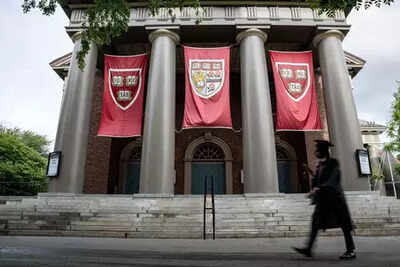ARTICLE AD BOX

In a shift reflecting Washington’s changing posture on academic collaboration, Harvard University has introduced a new screening system for international participants, faculty, and co-sponsors in all university-affiliated educational programmes.According to an internal presentation obtained by The Harvard Crimson, the measures will apply across executive education, online courses, workshops, and conferences, signalling a significant broadening of compliance oversight once reserved for science and technology ventures.
From research controls to blanket compliance
The slide deck, presented to staff of the Economics Department on 30 October, 2025, outlines expanded procedures requiring checks on attendees and collaborators from certain restricted nations, including China, Iran, and Russia.While export control laws have long governed international academic exchanges, the presentation links Harvard’s wider screening to what it described as a “different focus” under the Trump administration, The Crimson reports. Previous federal administrations largely limited such controls to high-technology or dual-use research. The current one, however, has extended scrutiny to all foreign collaborations, from social science workshops to online seminars.
University officials, attributed the change to both a shift in national security priorities and recent congressional inquiries into Harvard’s overseas engagements.
Link to sanctions and investigations
The new compliance policy follows months of political attention on a health policy conference at the Harvard School of Public Health, which included participation from the Xinjiang Production and Construction Corps, a Chinese paramilitary entity sanctioned by the US for human rights abuses in Xinjiang.The Trump administration has questioned whether Harvard breached sanctions law by co-sponsoring the event. In June, Secretary of State Marco Rubio urged the Treasury Department to investigate the matter after a report funded by the conservative Manhattan Institute alleged that Harvard’s collaboration continued even after the XPCC was blacklisted, The Crismson reports.University representatives said the updated policy forms part of its “commitment to complying with United States sanctions and export controls.”
The new approach, they said, reflects both the evolving security environment and the expectations of federal regulators.
How the new screening works
Under the new system, Harvard affiliates hosting in-person educational programmes must submit participant details, including nationality, affiliation, and event purpose, for internal review before approval. Programmes that are free and open to the public without prior registration will be exempt.A similar process for online courses is under consideration, particularly before accepting payments from international participants. The screening itself will use Visual Compliance, a platform that checks names against government watchlists and identifies links to sanctioned or restricted entities.Additional clearance will be required for individuals or organisations from “Countries of Concern” — a category that includes China, Iran, and Russia, as well as “High Cyber Risk Regions” such as Hong Kong, Cuba, and Sudan.
A changing academic order
Though new to Harvard, comparable systems have existed for years at peer institutions such as the University of Pennsylvania and the Massachusetts Institute of Technology. Immigration expert Dahlia French told The Crimson she was surprised that Harvard had not already implemented such controls, given its global reach and the tightening of federal export policies.As Harvard adjusts to a more restrictive policy, the test will be whether it can safeguard intellectual collaboration without compromising the principles that define it.

 4 hours ago
4
4 hours ago
4









 English (US) ·
English (US) ·